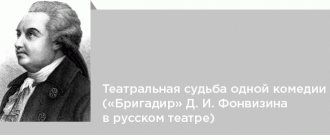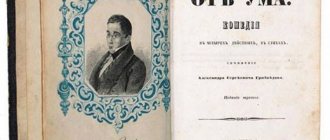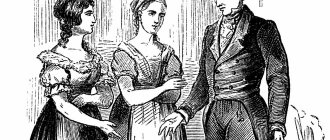Quotes from the heroes of “Woe from Wit” (table)
“The fools believed, they passed it on to others, the old women immediately sounded the alarm - and here is public opinion!”
***
“Why not a husband? There is only little intelligence in him; but who lacks intelligence to have children?”
***
“When I’m in business, I’m hiding from fun, when I’m fooling around, I’m fooling around, and there are a ton of experts in mixing these two crafts, I’m not one of them.”
***
“How can you introduce yourself to a little cross, or a small town, how can you not please your dear little one. ”
***
“To teach our daughters everything, everything – including dancing! and foam! and tenderness! and sigh! It’s as if we are preparing them as wives for buffoons.”
***
“Learning is the plague, learning is the reason that today there are more crazy people, deeds, and opinions than ever before.”
The cards are electronic (code), they will be sent in the coming days via VKontakte message or email.
Negative personality traits
Grouchiness.
The nobleman, the owner of the house, behaves like a bourgeois. He gets angry to no avail and is often in a mood when he is dissatisfied with everything. He is in a hurry, grumbling and scolding the courtiers. It’s surprising that the man himself knows about this property. But this only gives him a lot of pleasure. It seems that scolding is his normal state.
Coarseness.
In dealing with those who serve him, the owner of the house does not mince words. Such rudeness was characteristic of all nobles of the conservative part of society. Rudeness and power in this case are synonymous. For Famusov, servants are donkeys, blockheads, lazy grouse. Rudeness disappears when Famusov is surrounded by people of his circle or higher status. There is very poise and modesty here.
Loud intonations.
The owner's loudness frightens the residents. You can hear it everywhere. The voice is compared to trumpets. The master does not try to speak quietly. His position: I am the owner and have the right to shout.
Crazy.
A father can do such things that he is called crazy. Famusov is a true representative of the ruling part. Choosing expressions and changing behavior is not in his rules.
Flattery.
Pavel Afanasyevich flatters and is ready to please those from whom benefit is possible. Several scenes of his conversation with Colonel Skalozub provide a clear example of this behavior: changes in posture, speech and manner of speaking.
False entrepreneurship.
In Famusov’s time, this quality was called differently - a businessman. Any means are good to achieve your goals. He will do everything that will help him achieve the desired rank and reward.
Positive features
The reality is confirmed by adjacent negative and positive personality traits.
Good nature.
Pavel Afanasyevich’s attitude towards Chatsky characterizes him positively. After the death of Chatsky’s father, Famusov took him into his house and began to raise him as a son. Only a kind and caring father of the family, a true friend, could do this. This is how he is presented in relation to his daughter and childhood friend. Good feelings are also visible in relation to some courtiers, to secretary Molchalin.
Hospitality.
Many scenes confirm this quality of Famusov: Chatsky’s arrival, the ball, Skalozub’s arrival. You just need to understand that hospitality in the house is only for the rich. There is no place for the poor and ignorant.
Love for the past.
All old people cherish past events in their memory. The owner of the house protects the past and is afraid of criticism. Everything that has passed is his fate. Preserving the past is the task of his generation.
Description of Famusov’s appearance and character
Pavel Afanasyevich Famusov is a widower raising his daughter Sophia. The master is proud of his widowhood. The rich man did not tie the knot again because his mother was flighty. Freedom is compared to power. Famusov, “his own master,” does not want to depend on women’s whims. This position does not make him a person who shuns the opposite half. A nobleman flirts with a maid. Words can be heard from the speech that help to imagine how the owner of the house behaves when no one sees him:
- squeezes;
- flirts;
- indulges;
- changes facial expressions.
A rich man of age, but looks cheerful and fresh: he shows off his strong physique. Behavioral characteristics also speak about his health:
- fussy;
- quick;
- restless.
An interesting scene is where the event planning takes place. Pavel Afanasyevich strives not to lose all the necessary events in his memory: christenings, balls, funerals, and to put them on the calendar. This attitude is characteristic of real lordship. Characterizes the hero of a comedy as a dual quality. On the one hand, the property is positive. The owner of the estate does not want to offend anyone by missing an important event. On the other hand, negative. Listening to plans to attend the birth of someone who has not yet been born is funny. The speech is puzzling. It is blasphemous to place christenings and funerals side by side without even thinking about the significance of human life. From another perspective, this behavior is very real. Famusov is not a fictional character, but the personification of the majority.
Catchphrases from the comedy "Woe from Wit"
Persecution of Moscow. What does it mean to see the light! Where is better? Where we are not. Sofia Chatsky
***
The houses are new, but the prejudices are old; rejoice, neither years, nor fashion, nor fires will destroy them. Chatsky
***
French books make her sleepless, but Russian books make it painful for me to sleep. Famusov
***
What new will Moscow show me? Yesterday there was a ball, and tomorrow there will be two. Chatsky
***
And, by the way, he will reach the known degrees, After all, nowadays they love the dumb. Chatsky
***
A mixture of languages still prevails: French with Nizhny Novgorod? Chatsky
***
I'm strange, but who isn't? The one who is like all fools; Molchalin, for example.
***
- Of course, he does not have this mind, What a genius for others, but for others a plague. Sophia
***
When I’m in business, I hide from fun, When I’m fooling around, I’m fooling around, And when mixing these two crafts, there are many skilled people, and I’m not one of them. Chatsky
***
Although there are hunters everywhere to be mean, today laughter frightens and keeps shame in check; No wonder the sovereigns favor them sparingly. Chatsky
***
Fate, the prankish minx, has determined it herself: For all stupid people, happiness comes from madness, for all smart people, grief comes from madness. epigraph to “Woe from Wit”, not written by A.S. Griboyedov
***
- So! I have sobered up completely, dreams are out of sight and the veil has fallen. Chatsky
***
Why not a husband? There is only little intelligence in him; But who lacks intelligence to have children? Chatsky
***
Fate seemed to be protecting us; No worries, no doubts. And grief awaits around the corner. Sophia
***
I will tell you the truth about you, which is worse than any lie. Platon Mikhailovich Gorich
***
Yes, no urine. A million torments to the chest from friendly pressure, to the legs from shuffling, to the ears from exclamations, and most of all to the head from all sorts of trifles. Chatsky
***
Have mercy, you and I are not guys; Why are the opinions of others only sacred? Chatsky
***
- He hasn’t uttered a smart word for a long time, - I don’t care what’s for him, what’s in the water. Sophia
***
I don’t remember anything, don’t bother me. Memories! Like a sharp knife. Sophia
***
A boy-husband, a servant-husband, one of the wife's pages—the high ideal of all Moscow husbands. Chatsky
Worldview
Famusov is raising his daughter on his own. He adheres to the following opinion: “You don’t need another example, When the example of your father is in your eyes.”
Famusov is an ardent opponent of education. He says the following expressions: “Learning is a plague,” “If evil is to be stopped: Take away all the books and burn them,” “And reading is of little use.”
This characteristic with quotes allows us to say that Sophia is brought up in such a way that she is fenced off from books and “learning”.




